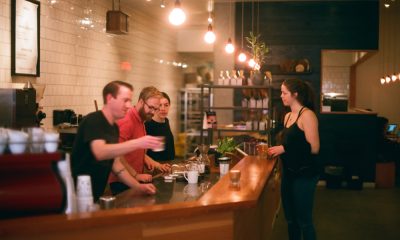Business
Stay safe and survive the second wave: The savvy investors guide to stock selection
Fears that the second wave of COVID-19 is underway are becoming more real every day. Infection rates are going up and concern is being felt around the globe. This presents a unique set of opportunities for investors and businesses alike. Those that can cater to a changing society the best will profit from the crisis. What are these trends, and who are the businesses which are dominating them?

A second wave of the Covid-19 is becoming an increasingly dire reality. Infection rates are already spiraling in France and the UK. Other European countries are also experiencing sharp upticks in their infection rates.
While there was reporting that questioned the validity of second wave fears. However, a lot of it is just hyperventilating about semantics. According to Professor Paul Hunter of Norwich Medical School, the virus needs to have disappeared for this to be a “second wave.” Instead, he likes to call it a “resurgence.”
In either case, the reality remains the same. Merely learning to say “potato” instead of “potahto” doesn’t change the fact that infection rates are going up.
It is also probable that they will only continue to do so, too.
Already, reports of disastrous returns to school are emerging. While experts predicted this would bump infection rates, their models did not take into account student non-compliance with health measures.
There is also no current evidence that prior exposure to the disease guarantees immunity. According to a recent WHO scientific brief, there is no evidence that even the presence of antibodies provides protection.
Second wave severity remains unknown, but consumer trends are
The consequences of a second wave are still unknown, and predictions vary by country and region. In Delhi, India, experts are “not too worried,” whilst in Toronto, Canada, a full-blown lockdown is a real possibility.
What is more predictable is the enduring effects that this outbreak will produce.
Already, peoples’ ways of life have changed dramatically. Shopping habits are changing, and home entertainment has taken off. Nowhere is this more true than it is for mobile gaming.
And wellness is also booming.
An Allegra Strategies survey found that COVID-19 is causing a majority of people to reconsider their wellness. Over 60% of respondents stated that they value wellness practices more than before the pandemic.
These changes in lifestyles and habits will have an enduring impact beyond the health crisis. What’s more, they also provide insight into how peoples’ needs and desires will manifest in the face of an intensifying epidemic.
Businesses pandering to proliferating trends prepared to profit from an ongoing pandemic
Every time there is an upset to the established ways of life, a unique set of challenges and opportunities presents itself to businesses. In any given global recession, where many firms face bankruptcy, there are plenty that boom. That such a thing as the lipstick index even exists proves it.
Although the lipstick index is proving unreliable in this pandemic (blame mass confinements—there’s no need for lipstick if we’re all staying home), the point still stands.
In every crisis, many businesses will flourish. Even a shrinking GDP will not stop people spending. Fundamentally, all that will change is the items towards which they direct their spending. On a macro level, this will mean a shift away from things like cars, whitegoods, expensive travel, and other big-ticket items.
Drilling deeper down, the manifestation of purchasing trends towards niches of smaller ticket items will reflect the general shape of society. When we’re still going out, we value the things we can show off.
This time around, however, whilst we’re all social distancing or confined, purchases for items providing personal, inner satisfaction are dominating.
So who are these businesses that are going to be the big winners as the second COVID-19 wave rises?
Rritual: Adaptogens for stress and anxiety
According to Ana Ferrell, VP of Marketing at ADM, “consumers’ attitudes, priorities and behaviours are shifting significantly.” She says that this “is providing a unique opportunity for forward-looking food and beverage companies to bring a suite of trailblazing new products to market.”
Research by the company looking into COVID-19’s impact on food and beverage trends reveals several critical trends. Amongst those that are taking off with the crisis are self-care, emotional wellbeing and nutrition.
Rritual is currently developing a range of mushroom-based health products, hitting all of these nails on the head at once.
As if it wasn’t evident in their name already, Rritual designed their range of teas and powders to become a daily ritual. Something one can do for one’s mental health as self-care becomes more important.
But the big nail that Rritual is hitting is its use of mushrooms in creating adaptogen-rich health supplements.
Used for centuries in Chinese medicine and Ayurveda, adaptogens supplement the bodies ability to resist and adapt to stress. They were already an emerging trend ahead of the pandemic, and will only accelerate in adoption as the crisis endures.
The strain of the crisis is taxing peoples’ mental health, and this will increasingly drive consumers towards products which help them cope.
Palate Club: A personalized wine subscription service with a focus on healthy wines
As bars have shut down and people have become more health-conscious, the alcohol industry, in general, has taken a massive hit. But, as is always the case, where there is a crisis, there are those who will find a way to harness it.
Palate Club is doing just this, offering a timely subscription wine service with a big focus on personalization and health. Its offering is going to be massively appealing to customers as health consciousness, and personal satisfaction takes off.
On the health front, wine has long been offering many health benefits. It is often correlated with lower rates of heart disease, to name but one. But, to get the full benefits, quality wine must be chosen.
This is where Palate Club shines with its wine delivery service. Their tireless pursuit of quality means they reject 95% of wines, meaning their customers only receive the best.
Throw in the personalization which Palate Club is offering through their wine tasting app, and the fact subscribers never need to leave the house, and you have a winning, COVID-19-proof company.
XRApplied and Leaf Mobile: Dominating the mobile gaming trend
Moving away from health, but sticking with the personal satisfaction trend, are XRApplied and Leaf Mobile (TSX.V: LEAF). Both cater to the exploding mobile gaming market.
Just like adaptogens, mobile gaming was a trend taking off ahead of the crisis. The COVID-19 outbreak merely accelerated it.
What makes these two companies particularly well-positioned to dominate the market is their unique intellectual property.
On Leaf Mobile’s side, the power of celebrity endorsements is already paying dividends. Their counter-cultural game, Cheech and Chong’s Bud Farm, was a massive hit. Many players flocked to the cannabis game and, consequently, Leaf just posted record Q2 revenue results. They now have another collaboration in the works, this time working with Cypress Hill rapper B-Real. The new release promises to be a big hit.
XRApplied is a little less counter-cultural, but no less revolutionary with their IP.
Catering to the development side of gaming, their cross-platform VR/AR Software Development Kit is a market leader. Already beating Google and Apple in device compatibility, adoption of their technology is ready to take off.
What is particularly appealing about XRApplied’s business is that their IP doesn’t depend on any particular trend. Their technology can be applied just as readily to any VR/AR application, whether it be virtual travel or picking/packing information overlay in warehouses. The applications are endless.
—
(Featured image by Anna Shvets via Pexels)
DISCLAIMER: This article was written by a third party contributor and does not reflect the opinion of Born2Invest, its management, staff or its associates. Please review our disclaimer for more information.
This article may include forward-looking statements. These forward-looking statements generally are identified by the words “believe,” “project,” “estimate,” “become,” “plan,” “will,” and similar expressions. These forward-looking statements involve known and unknown risks as well as uncertainties, including those discussed in the following cautionary statements and elsewhere in this article and on this site. Although the Company may believe that its expectations are based on reasonable assumptions, the actual results that the Company may achieve may differ materially from any forward-looking statements, which reflect the opinions of the management of the Company only as of the date hereof. Additionally, please make sure to read these important disclosures.

-

 Crypto7 days ago
Crypto7 days agoRipple Launches EVM Sidechain to Boost XRP in DeFi
-

 Africa2 weeks ago
Africa2 weeks agoCôte d’Ivoire Unveils Ambitious Plan to Triple Oil Output and Double Gas Production by 2030
-

 Impact Investing2 days ago
Impact Investing2 days agoShein Fined €40 Million in France for Misleading Discounts and False Environmental Claims
-

 Business2 weeks ago
Business2 weeks agoThe TopRanked.io Weekly Digest: What’s Hot in Affiliate Marketing [NordVPN Affiliate Program Review]

























